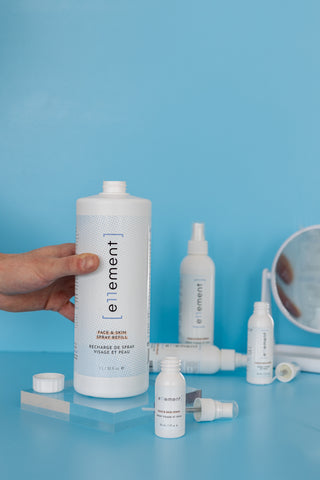Skincare trends often come and go, but some ingredients make a lasting impact. Hypochlorous acid is one such ingredient that has recently gained significant attention. Known for its antimicrobial properties and gentle nature, hypochlorous acid is becoming a popular choice in skincare routines. However, as with any trending ingredient, it’s essential to understand its safety, especially when used at home.

What is Hypochlorous Acid?
Hypochlorous acid is a weak acid that naturally occurs in the human body. It plays a crucial role in the immune system, acting as a defense mechanism against pathogens. In skincare, hypochlorous acid is valued for its ability to kill bacteria, viruses, and fungi, making it an effective solution for treating various skin conditions.
This acid is produced by the body’s white blood cells and is involved in the body’s natural healing process. When applied to the skin, hypochlorous acid can help reduce inflammation, soothe irritation, and promote healing. Its gentle nature makes it suitable for all skin types, including sensitive skin.
The Benefits of Hypochlorous Acid in Skincare
The benefits of hypochlorous acid in skincare are numerous, making it a versatile and valuable addition to your routine. Here are some key advantages:
- Antimicrobial Properties
Hypochlorous acid is highly effective against a wide range of microorganisms. It can eliminate bacteria, viruses, and fungi on the skin, reducing the risk of infections. This property is particularly beneficial for individuals with acne-prone skin, as it helps prevent breakouts by keeping the skin free from harmful microbes.
- Reduces Inflammation
Inflammation is a common issue in various skin conditions, including acne, eczema, and rosacea. Hypochlorous acid has anti-inflammatory properties that can help soothe the skin and reduce redness and swelling. This makes it an excellent choice for calming irritated skin.
- Promotes Healing
Hypochlorous acid aids in the skin’s natural healing process. It accelerates the recovery of wounds, cuts, and other minor injuries by promoting tissue repair. This makes it a valuable ingredient for post-procedure skincare, such as after chemical peels or laser treatments.
- Safe for Sensitive Skin
One of the most significant advantages of hypochlorous acid is its gentle nature. It is non-irritating and non-sensitizing, making it suitable for all skin types, including sensitive and reactive skin. Unlike some harsh antimicrobial agents, hypochlorous acid does not disrupt the skin’s natural barrier, ensuring that it remains healthy and balanced.
- Versatile Use
Hypochlorous acid is not limited to treating specific skin conditions. It can be used as a general-purpose skincare product to maintain skin health, prevent infections, and promote a clear complexion. It is available in various forms, including sprays, cleansers, and toners, making it easy to incorporate into your daily routine.
Is Hypochlorous Acid Safe for Home Use?
With its many benefits, the question arises: Is hypochlorous acid safe for home use? The short answer is yes, but with some caveats.
Understanding the Concentration
The safety of hypochlorous acid largely depends on its concentration. In skincare products, hypochlorous acid is typically present in low concentrations, ranging from 100 to 200 parts per million (ppm). At these levels, it is safe for topical use and does not pose a risk of irritation or toxicity.
However, it’s essential to avoid using hypochlorous acid in higher concentrations without proper guidance. High concentrations can be more potent and may cause skin irritation or other adverse effects. Always ensure that the product you’re using is formulated specifically for skincare purposes and follows recommended guidelines.
Proper Storage and Handling
Hypochlorous acid is relatively stable when stored correctly, but it can degrade over time, especially when exposed to light and air. To maintain its efficacy, store hypochlorous acid products in a cool, dark place, and follow the manufacturer’s instructions for storage and usage.
Additionally, always use clean hands or tools when applying hypochlorous acid to the skin to avoid contamination. Proper handling ensures that the product remains effective and safe for use.
Potential Side Effects
While hypochlorous acid is generally safe, some individuals may experience mild side effects, particularly if they have very sensitive skin. These side effects can include:
- Mild stinging or burning sensation
- Temporary redness
- Dryness or tightness of the skin
If you experience any of these symptoms, discontinue use and consult with a dermatologist. It’s always a good idea to perform a patch test before applying a new product to your face or body, especially if you have sensitive or reactive skin.
Conclusion
Hypochlorous acid is undoubtedly a rising star in the skincare world, offering a range of benefits from antimicrobial properties to soothing inflamed skin. Its gentle nature and versatility make it a valuable addition to any skincare routine. When used correctly, hypochlorous acid is safe for home use and can help address various skin concerns.























